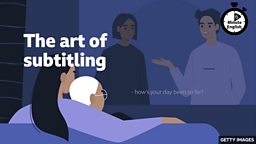6 Minute English
Intermediate level
Can you stop a disaster?
Episode 230803 / 03 Aug 2023

(Image: Getty)
____________________________________________________________________________
Learn more about the environment
____________________________________________________________________________
Introduction
Natural disasters can cause death and destruction. Should we just accept them, or is there any way we can stop natural disasters being so damaging?
This week's question
Which natural disaster is most responsible for human deaths? Is it:
a) earthquakes?
b) tsunamis? or,
c) hurricanes?
Listen to the programme to hear the answer.
Vocabulary
act of God
natural event or disaster that cannot be controlled or prevented by humans
fatalism
belief that people cannot change the way things happen
within your grasp
very likely to be accomplished
megaphone
handheld cone-shaped device that makes your voice louder when you speak into it
evacuation
moving people from a dangerous place to somewhere safe
livelihood
job, work or activity that gives you the money to buy the things you need to live
TRANSCRIPT
Note: This is not a word-for-word transcript.
Beth
Hello. This is 6 Minute English from BBC Learning English. I’m Beth.
Neil
And I’m Neil. Depending on how you look at it, Roy Sullivan was either the luckiest or the unluckiest man alive. Working as a US park ranger, Roy was struck by lightning on seven different occasions, and survived them all!
Beth
But Roy isn't the only victim of an unpredictable natural event, sometimes called an act of God. In the last decade, an estimated half a million people have died globally in natural disasters such as earthquakes, tsunamis, hurricanes and cyclones.
Neil
In 2023, at least 60,000 people died after earthquakes in Turkey and Syria, and things are predicted to get worse in the future due to climate change and increasing populations. So can anything be done to stop natural disasters? Or, like Roy Sullivan, should we accept that some things are beyond our control? In this programme we'll be finding out, and, as usual, we'll be learning some useful new vocabulary too.
Beth
Throughout history, floods, when there's too much water, and droughts, when there isn't enough, have caused most human deaths. But with climate change, new dangers are emerging. But do you know, Neil, which natural disaster is most responsible for human deaths now? Is it:
a) earthquakes?
b) tsunamis? or,
c) hurricanes?
Neil
I'm not sure, but you do hear a lot about terrible earthquakes in the news, don't you? Probably earthquakes.
Beth
Now, in her job as Professor of Hazard and Risk at Durham University, Lucy Easthope attends conferences to advise on planning for natural emergencies. But according to Lucy, describing disasters as ‘natural’ is a mistake, as she told BBC Radio 4 programme, Inside Science:
Professor Lucy Easthope
Probably the worst thing you can do at a disaster conference is describe it as natural disaster because that's the hopelessness right there. The ‘natural’ implies a sense of fatalism and a sense of ‘let's give up now’ whereas in fact, these events … there's huge elements that we have in our grasp to both prevent, and more importantly perhaps prevent additional harm.
Neil
Professor Easthope thinks calling disasters ‘natural’ is fatalistic - it involves the belief that people are powerless to change events.
Beth
Although no-one can prevent an earthquake, there are ways people can reduce the damage done, what Professor Easthope calls ‘additional harm’. Often this additional harm, things like the spread of diseases or destroyed roads and buildings, are worse than the disaster itself. Fortunately, ways to limit the damage are within our grasp. If something is within your grasp it is very likely that you will achieve it.
Neil
It may be impossible to stop disasters from happening, but there are ways to limit the number of deaths. An earthquake in the middle of the ocean is less of a disaster than in a populated city, so one technological solution involves computers mapping geological movements to identify places at risk. But low-tech solutions can be just as effective.
Beth
Bangladesh has seen a hundred fold decrease in cyclone deaths since the introduction of its new monitoring and alert system. Ilan Kelman, Professor of Disasters and Health at UCL, has been involved in the project, and told BBC Radio 4's Inside Science how it worked.
Professor Ilan Kelman
What Bangladesh has done is realise we cannot have 100,000 people dying in a cyclone each time. So in addition to having people on bicycles with megaphones going out and saying, ‘Look a cyclone is coming, please get to shelter!’, people in the danger zones have grown up accepting that their shelters will be safe, knowing where the evacuation routes are, but most importantly that they can return afterwards to their homes and to their livelihoods because they've built the infrastructure, and they've built their jobs in order to avoid being destroyed by the cyclone.
Neil
One low tech solution involves people on bicycles shouting warnings about approaching cyclones into a megaphone – a handheld cone-shaped device that makes your voice louder when you speak into it. Once people know the danger, they can start the evacuation - moving people from a dangerous place to somewhere safe.
Beth
The Bangladeshis have built shelters which protect everyone - children, the old and sick, even animals - so that when the cyclone is over they can safely return to their livelihoods - their work, job, and other activities which give them the things they need to live.
Neil
Well, It's great to see people working together to survive cyclones, earlier we were talking about other natural disasters.
Beth
We were, and I asked you which disaster you thought caused most deaths and you said you thought maybe earthquakes, which was the right answer, which is why these new ideas to save lives are so hopeful. OK, let's recap the vocabulary we've learned from this programme on natural disasters - unpredictable events or catastrophes which cannot be controlled by humans, and which are sometimes called acts of God.
Neil
Fatalism is the belief that people are powerless to change the way things happen.
Beth
If something is within your grasp, it’s likely to be accomplished.
Neil
A megaphone is a handheld cone-shaped device that makes your voice louder when you speak into it so that people can hear you from far away.
Beth
Evacuation means moving people from a dangerous place to somewhere safe.
Neil
And finally, livelihood is your job or the work that gives you the money to buy the things you need to live. Once again our six minutes are up! Goodbye everyone!
Beth
Bye!
Latest 6 Minute English

Sexism: Female farmers fighting back
Episode 231228 / 28 Dec 2023
How can female farmers beat rural sexism?



Invasive species: Why don't we eat them?
Episode 231207 / 07 Dec 2023
Could we eat invasive species?

What and where is Little Italy?
Episode 231130 / 30 Nov 2023
Mozzarella, ricotta, cannolis and focaccia... Where are we? Little Italy of course!

Social media and teenage health
Episode 231123 / 23 Nov 2023
What are the health risks of social media for teenagers?








Sounds that make you want to scream
Episode 230928 / 28 Sep 2023
Are there any sounds you find upsetting?




The stories behind our names
Episode 230831 / 31 Aug 2023
What do our names reveal about our culture and family history?


Are you unhappy at work?
Episode 230817 / 17 Aug 2023
Does work leave you feeling bored and exhausted?







Is it wrong to eat plants?
Episode 230629 / 29 Jun 2023
Should we treat plants with the same consideration we treat animals with?



The art of subtitling
Episode 230608 / 08 Jun 2023
Hear how subtitles can help bring TV and movies to life

Ecotourism: good or bad?
Episode 230601 / 01 Jun 2023
We discuss the growing popularity of ecotourism.

Can climate change cause more disease?
Episode 230525 / 25 May 2023
With warming temperatures, mosquitos are now spreading to new areas, including Europe.



Ice and the origins of life on Earth
Episode 230504 / 04 May 2023
We talk about an essential element for life to thrive.

Women in politics
Episode 230427 / 12 Apr 2023
We discuss some of the reasons why women make up only 26% of the world's politicians.

What's the point of museums?
Episode 230420 / 20 Apr 2023
We discuss the role of museums in the 21st century and the items taken from different countries.

How culture affects sadness
Episode 230413 / 11 Apr 2023
What ways do you think culture can influence sadness?

Would you eat a Kalette?
Episode 230406 / 06 Apr 2023
Hear about a new kind of vegetable making an entrance in British kitchens

Do you get jealous easily?
Episode 230330 / 06 Mar 2023
Let's talk about the ugly green-eyed monster


Food and mood
Episode 230316 / 16 Mar 2023
We look at the link between what you eat and how you feel.

How to talk to a climate denier
Episode 230309 / 09 Mar 2023
The dos and don'ts of trying to discuss science with someone who doesn't believe in it

Losing your mother tongue
Episode 230302 / 02 Mar 2023
Hear the story of a woman who replaced her native Czech for English.

The health benefits of apples
Episode 230223 / 23 Feb 2023
Could 'an apple a day keep the doctor away'?


Doomscrolling: Why do we do it?
Episode 230209 / 27 Jan 2023
What is doomscrolling and why are we attracted to bad news? Listen to find out!

Exercise for the lazy
Episode 230202 / 22 Jan 2023
What's the least amount of exercise you should do to stay healthy?

Can AI have a mind of its own?
Episode 230126 / 26 Jan 2023
Hear about the software engineer who became 'friends' with his computer

Climate change: Are there too many people?
Episode 230119 / 13 Jan 2023
Does the size of your carbon footprint depend on where in the world you were born? Listen to find out!

The hidden life of buffets
Episode 230112 / 12 Jan 2023
Neil and Sam discuss buffet meals and the history behind them.

Songwriting
Episode 230105 / 05 Jan 2023
Writing a memorable song isn't easy. So is there an art to good songwriting?







